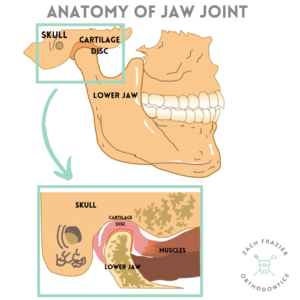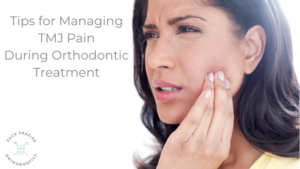Tips for Managing TMJ Pain During Orthodontic Treatment: Questions and Answers
February 10th, 2021
According to the National Institute of Dental and Craniofacial research, the prevalence of TMJ problems (also known as temporomandibular joint and muscle disorder) is between 5% - 12% of the population. It is more common in females than males, and tends to affect younger people more often.
While orthodontic treatment does not cause TMJ issues, studies also show that it cannot prevent or treat TMJ pain either. Here are some common questions that you may have if you are in orthodontic treatment and are now experiencing some jaw joint pain.
 What does TMJ stand for and what is it?
What does TMJ stand for and what is it?
- TMJ stands for temporomandibular joint. It is located directly in front of your ears, and it is where your lower jaw hinges upon opening and closing.
What are TMJ problems?
- TMJ problems include clicking/popping joints, painful joints, or restricted jaw movement. TMJ problems may vary in severity from mild pain to severe pain, and the pain may be a temporary pain or a constant pain. TMJ problems may be related to the actual joint (bones and ligaments), or it may be related to the muscles around the joint.
What causes TMJ problems?
- TMJ problems may be caused by an injury to the face or jaw, grind/clenching of teeth, stress, muscle fatigue or overuse of the jaw joint. Additionally, it is linked to hormonal changes in women that cause laxity of the ligaments in the jaw joint. TMJ problems are most common in teenage girls and young women.
What can I do to improve my TMJ problems or TMJ pain?
Most TMJ problems can be managed by these conservative measures:
- Maintain a soft diet, and avoid chewy food and chewing gum.
- Use warm, moist heat on the jaw muscles to increase blood flow and massage the muscles. Alternate the warm moist heat with an ice pack on the joint area which will help reduce inflammation of the joints.
- Use anti-inflammatory medications to help reduce pain and inflammation. Ibuprofen is the most common, but you should consult your physician with which anti-inflammatory medication is best for you.
- Avoid clenching your teeth by setting up reminders to keep your teeth apart and jaw muscles relaxed.
- Monitor your stress and manage it to avoid muscle tension and clenching.
What if my symptoms do not improve with conservative therapy?
- If your symptoms are not improving, a referral will be made to another doctor who specifically manages TMJ problems. They may recommend more diagnostic imaging (like an MRI) to evaluate the jaw joint to find the cause of the problem. In some cases, a night guard may be recommended to help alleviate some pain.
Can I continue my orthodontic treatment?
- In some cases, orthodontic treatment may be paused for a period of time, and occasionally it may be discontinued depending on the circumstances. The recommendations are on a case by case basis.
If you have any other questions, please let your orthodontist know. More often than not, a little patience and conservative measures will improve the TMJ pain, so hang in there : )
